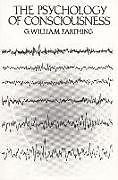Psychology Of Consciousness
Einband:
Kartonierter Einband
EAN:
9780137286683
Untertitel:
Englisch
Genre:
Medizin
Autor:
Farthing
Herausgeber:
Pearson Academic
Anzahl Seiten:
480
Erscheinungsdatum:
01.10.1991
ISBN:
978-0-13-728668-3
Klappentext
The first book on consciousness that offers sufficient breadth and depth to serve as a stand-alone text for courses on consciousness. Also ideally organized as a supplement for instructors who discuss topics of consciousness in other courses.Journey into the fascinating world of human consciousness with this comprehensive survey that covers topics of consciousness from both a natural science and cognitive psychology viewpoint. Based on the belief that consciousness is a natural phenomenon and product of the brain's functioning, Dr. Farthing's captivating book emphasizes systematic research and theoretical interpretations and also discusses clinical applications and pertinent conceptual and philosophical issues.
Zusammenfassung
Covers topics of consciousness from both a natural science and cognitive psychology viewpoint. Based on the belief that psychology is a natural phenomenon and product of the brain's functioning, it emphasizes systematic research and theoretical interpretations and discusses clinical applications.
Inhalt
(NOTE: Each chapter concludes with a Summary and Endnotes.)
1. The Concept of Consciousness.
The domain of the psychology of consciousness. Mind. Concepts of consciousness. A levels of consciousness model.
2. Characteristics of Consciousness.
Higher-order characteristics of consciousness. Aspects of conscious experience. The unity of consciousness.
3. Introspection I: Methods and Limitations.
Introspection and introspective verbal reports. Types of introspection. Limitations of introspective verbal reports. Methods of obtaining introspective reports. The process of introspection. Conclusion.
4. The Mind-Body Problem.
Approaches to the mind-body problem. Dualism. Varieties of materialism. Reductionism. The other-minds problem.
5. Brain and Consciousness I: Split-Brain Research.
A brief overview of brain organization. Split-brain research. The question of dual consciousness. Consciousness, language, and brain modularity. Left-brain, right-brain mania.
6. Brain and Consciousness II: Dissociations between Consciousness and Behavior.
Blindsight. Amnesia. Other neuropsychological dissociation syndromes. Explaining dissociation syndromes. Nonconscious processing in normal subjects.
7. Introspection II: Access to the Causes of Behavior.
Nisbett and Wilson's anti- introspectionist theory. Evidence for introspective access. Conclusion.
8. Daydreaming and the Stream of Consciousness.
Dimensions of thought in normal waking states. Research on daydreaming. The functions of daydreaming. Sensory deprivation and consciousness. Toward a theory of the stream of consciousness.
9. Altered States of Consciousness.
The variety of ASCs. The importance of ASCs. The concept of altered states of consciousness. Dimensions of changed subjective experience in ASCs. Producing altered states of consciousness. Identifying specific ASCs. Studying ASCs: Subjective and objective knowledge.
10. Sleep.
Sleep-wake cycles. Stages of sleep. The function of sleep. Sleep deprivation and human performance. The function of REM sleep. Sleep disorders.
11. Dreaming I: Phenomenology and Influences on Contents.
Definition of "dream." Your own dream diary. Phenomenological characteristics of REM dreams. Dreaming in NREM sleep. Laboratory dreams compared with home dreams. Sleep onset: The hypnagogic state. Factors that influence dream contents.
12. Dreaming II: Theories and Research.
Sigmund Freud's psychoanalytic theory of dreaming. Hobson and McCarley's neurophysiological theory of dreaming. David Foulkes's cognitive theory of dreaming. The functions of dreaming.
13. Dreaming III: Dream Recall and Lucid Dreaming.
Dream recall and forgetting. Lucid dreaming. Concluding comments on dreaming.
14. Hypnosis I: Basic Phenomena, Hypnotic Susceptibility, and Applications.
The definition of hypnosis. Hypnotic induction. The measurement of hypnotic suggestibility. Types of hypnotic suggestions. The subjective experience of hypnosis. Correlates of hypnotic susceptibility. Can hypnotic susceptibility be modified? Clinical applications of hypnosis. Is hypnosis dangerous?
15. Hypnosis II: Theories and Research on Hypnotic Analgesia and Posthypnotic Amnesia.
Hypnosis theories: Overview. Hypnotic analgesia and hypnosis research methodologies. Higard's neodissociation theory. The social-psychological approach to hypnosis. Posthypnotic amnesia.
16. Hypnosis III: Hypnotic Age Regression and Hypermnesia.
Hypnotic age regression. Response incongruities and trance logic. Hypnotic hypermnesia. Concluding comments on hypnosis.
17. Meditation.
Aims of meditation. Types of meditation techniques. How to meditate. Effects of meditation: A case study. State effects of meditation: Systematic research. Long-term (trait) effects of meditation. The meditation paradox. Biofeedback and the "Alpha State." Mystical experiences.
18. Psychedelic Drugs I: Marijuana.
A brief history of marijuana use. Subjective effects of marijuana. Experimental research on marijuana. Interpretations of marijuana's effects. Is marijuana harmful? The marijuana paradox.
19. Psychedelic Drugs II: The Major Hallucinogens.
Psilocybin mushrooms. Peyote. LSD. Hallucinations. Concluding comments on psychedelic drugs.
References.
Index.

Leider konnten wir für diesen Artikel keine Preise ermitteln ...
billigbuch.ch sucht jetzt für Sie die besten Angebote ...
Die aktuellen Verkaufspreise von 6 Onlineshops werden in Realtime abgefragt.
Sie können das gewünschte Produkt anschliessend direkt beim Anbieter Ihrer Wahl bestellen.
Loading...
Die aktuellen Verkaufspreise von 6 Onlineshops werden in Realtime abgefragt.
Sie können das gewünschte Produkt anschliessend direkt beim Anbieter Ihrer Wahl bestellen.
| # | Onlineshop | Preis CHF | Versand CHF | Total CHF | ||
|---|---|---|---|---|---|---|
| 1 | Seller | 0.00 | 0.00 | 0.00 |
